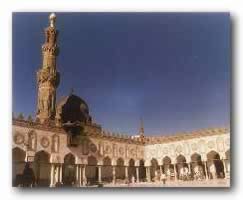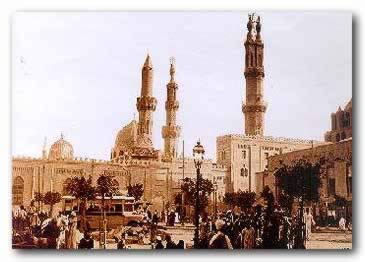|
Al-Azhar mosque, university and cultural
center which attracts scholars and frequenters from all over the globe -
was built the leader Gawhar the Sicillian, in the Fatimid Era in the
eastern south of Cairo near the big palace which was established there
between the Delum quarter in the north and Turks quarter in the south.
Al Azhar was the first mosque in the Fatimid Cairo. Gawhar started
construction on 2nd April 970, and finished his work in 972.
The establishment of Al-Azhar was scientific,
political and religious. It was very effective and its role was
wide-ranged all over the world for more than thousand years through
different long periods. Fatimids built it after taking Egypt as a base
for their regime and gave it the name of Al-Azhar in respect to "Fatima
El-Zahraa", for whom they belong.
Multi-disciplines
They employed about forty of the Shiites
scientists who spread their religious denomination, propagated for their
policy and declared their rule. So it was natural that the Ayobians
tried to change the Fatimid colour in Al-Azhar and denied it for hundred
of years in order to succeed in their try. The reason was to let
Al-Azhar play its political role from their point of view. Ottomans'
deed with Al-Azhar was, approximately, the same, disregarding their
leaders' flattery for Al-Azhar scholars and students.

It is worth mentioning, that political and
religious role played by Al-Azhar was not available for any other
Islamic University all over the world. The famous orientalist historian,
K.Vollers, indicated reasons for this high position of the mosque and
said that being the center of Islamic world, near Al Hegaz, Egypt's
economic importance, its Arabic touch, the extension of Africa and old
culture of the Nile which let good seeds for arts and science grow on,
are all the reasons of the high position of Al-Azhar.
Whatever the matter was, Al-Azhar role was
famous in all incidents and political revolutions which followed each
other through ages. Its role in the Islamic world embodied the famous
role of Egypt in all Islamic periods from the first Islamic revolution
in the time of Osman-Ibn-Affan.
Leading
sheiks
Sheiks
of Al-Azhar took the same position of kings and leaders, if it was not a
higher in their characteristics, times, and dimensions. Leadership and
administration was the prerequisite of the sound sheik.
But Al-Azhar
role was not of Al-Sheik's deeds alone. It was of all its scholars,
students, and patriotic public opinion which was determined by Al-Azhar.
If Al Sheik or a scholar got weakened and slackened in continuing the
patriotic movement, he would have to face the gathering people of
scholars and students who would remove him from his position and
powerfully, continue their patriotic movement and do their best efforts
to pave the way for freedom.
There were
many examples of these political revolutions of Al-Azhar, like the
revolution of March 1800 against the French. It lasted a long period and
the French troops lost more than what people lost. As we can talk a lot
about this subject, one will recognize the most famous ones.

Revolutions
On 31st October, 1798 and after three months
of the French expedition on Egypt under the leadership of Napoleon,
Cairo's first revolution started, and so many reasons were indicated,
like economic depression, or stalemate of the markets and bad
conditions, while El-Gabarty and Napoleon agreed on the following
reasons; commands by the French administration which exhausted people,
forced loans and forced sale which were imposed, robbing, fees and entry
duties with its attrition and distress.
Cairo's first
revolution with its proof of instability of French troops or success in
achieving their goals in controlling Egypt, followed by the defeat of
Napoleon in AKA were all of the reasons which made him secretly fly to
France on 17th August 1799, leaving his army under the leadership of
Kleiber. This encouraged Ottomans to invade the French in Egypt
depending on the Egyptian people's assistance.
But the Ottomans invasion, stimulated by
British forces, urged Kleiber to fight the Egyptian-Turkish army and
gain victory, coming cheerful to Cairo. However, Cairo's second
revolution met him. People were greatly distressed after the defeat of
their soldiers and also Turkish Muslim soldiers, and so the opportunity
of getting rid of the oppressor French occupation was lost. This
revolution was followed by killing Kleiber by Soleiman El-Halaby,
stimulated by international developments which led to the liquidation of
the French occupation, after three bloody years ended by sweet words in
the patriotic book. One of the historical revolutions was the May
revolution in 1805.

Egyptians practiced by the patriotic strife
work, its hardships and responsibilities all over three years during the
time of the occupation, gained victory after the evacuation of the
French troops from their homeland. Egyptians felt the power and weakness
of the Ottomans, being protected by the imperialist Britain to achieve
their common goals.
On 12th May
1805, people gathered near Al-Azhar; scholars, students, merchants,
peasants and workers, headed by Sheik El-Sharkawy of Al-Azhar Mosque and
University, and Omar Makram, held a public conference and decided the
following list of demands from the Turkish leader; the removal of
soldiers from Cairo to Giza, any soldier could not enter Cairo with his
gun, taxes should be, previously, accepted by Al-Azhar scholars and
prominent personalities, and re-established transport between Cairo and
Upper-Egypt.
But the leader was tardy. Then the revolvers held another conference on
the second day and went to Mohamed Ali Pasha's house in large numbers
presenting their conditions to the leadership, embodying people's
desire. Their conditions could be summarized in; judging justly
according to the tolerant Islamic Sharia, settlement of things should be
agreed upon by people, and if the leader went against the public
opinion, he should be retired from the service. The leader, Mohamed Ali
Pasha, consented to these conditions and freedom gained the victory,
while battles continued to protect its being.
Leading role
The year 1919 was the top of the Egyptian
patriotic revolutions, and the birth of effective independence movement.
It was done unanimously; all villages and cities contributed. Every one,
courageously, did his role. Orders from the military authority of the
British troops aimed at all villages and cities at the same time. But we
can see, clearly, the role of Al-Azhar. The leader of this revolution,
Saad Zaghloul, was one of Al-Azhar's students who were educated and
graduated there.
His
enlightenment grew by foreign culture and literature which were
translated into his native language. Al-Azhar was the permanent audience
of Muslim and Christian revolutions, supporting cooperative patriotic
union, doing their best efforts to carry out revolution's plans in all
Egyptian regions. Reader of Egypt revolutions' diary, whatever he is
Egyptian or otherwise, can easily find out the effective role of the
mosque in 1919.

The leading role revealed from the first day
when the expulsion of Saad Zaghloul, Mohamed Mahmoud, Ismael Sedky, and
Hamd El-Basel to Malta was effected after the appeal of the Egyptian
delegation to end the British sponsorship and accepting Egypt as an
independent country, still has its sway. The idea of revolution was
vehement in Egyptians' hearts and minds as a result of the bad deal
received from the British, especially in the years of the First World
War.
After the war, the Egyptian patriotic front
rows started the appeal for their rights. As the British authority
arrested some of the leaders of the patriotic movement headed by Saad
Zaghloul, then the people unanimously stood, without any organization,
against the British existence declaring the revolution on them.
This historical revolution was born on the 9th
of March 1918, and from that date Al-Azhar was the only bastion, the
starting point from where they could depart, and to where they could
turn their eyes. They met and listened to speeches in these forums and
invited people to stand against the occupation troops.
On the second
day students declared the following; "Tomorrow is Thursday, the peaceful
public demonstration will start at 10 o'clock in the morning, the
starting point is Al-Azhar, passing by the patriotic quarters, following
Hasab-Allah Mosque and flags, till twelve o'clock, then go to the public
hospital where a group of doctors, lawyers, scientists, teachers and
students who aim and pleased to be ideals for people, unite with them.
At dawn of the following day, people marched
to Al-Azhar where scholars and students, wonderfully, received and
arranged them to listen to speeches saying their mind.
So Al-Azhar
was a public place for oratory and the only place where the military
authority failed to break into. This is due to its high religious
position. Al-Azhar that time was a place where competitors of oratory
did their best and managed to highlight their talent. Also, there was an
enlightened role played by the patriotic scholars in the beginning of
the 20th Century in facing the British occupation...
The long story
of holy struggle does not end.
http://www.touregypt.net/azhar/al%20azhar1.htm
|